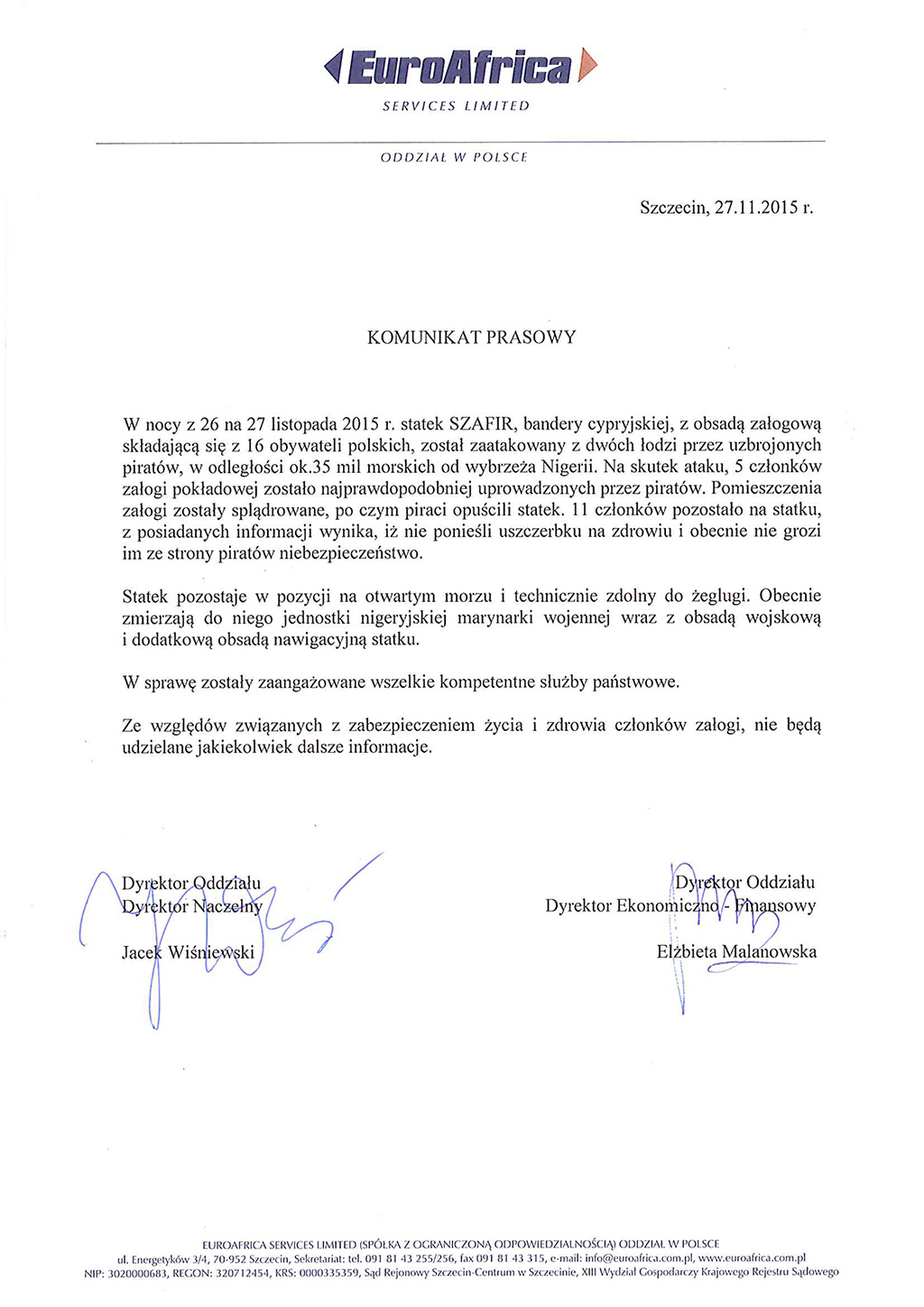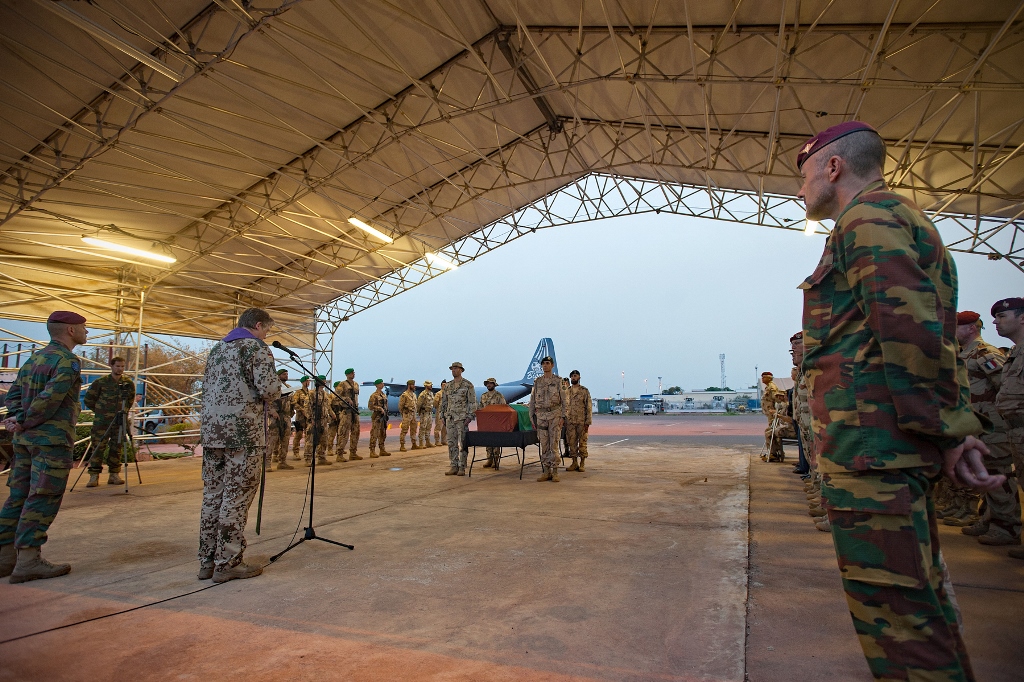5 Polish sailors hostage to the pirates. Nigerian piracy still active (v3)
(B2) Five Polish sailors — the captain, 3 officers and a sailor — were captured by Nigerian pirates 35 miles offshore. Kidnapping confirmed by the shipowner (see below) as well as the Polish Ministry of Foreign Affairs, Witold Waszczykowski, this Friday (November 27). The attackers aboard two motor channels boarded the vessel on the night of 26–27 November. True to their habits, the pirates wanted to take control of the freight. Part of the crew barricaded themselves. Before withdrawing, taking a few hostages to cover their escape, the pirates ransacked the cabin. 11 Polish sailors out of the 16 on the crew are safe and sound on the boat.
A Nigerian patrol boat as reinforcements
(update) A Nigerian navy patrol boat has joined the Szafir, with reinforcements from the crew and Nigerian navy officers on board, allowing it to reach its destination port safely, it said on Saturday (Nov 28). ) THE ministry Foreign Affairs. The task force, set up at the ministry's headquarters since Friday, held another emergency session on Saturday (November 28).
A crisis test for the new Polish government
This is the first crisis facing the new government of Beata Szydło (PiS), which seems quite surprised by the turn of events. No other information filtered through Warsaw on the means (diplomatic or otherwise) committed to come to the aid of the sailors. The Polish authorities claim to rely on the Nigerian authorities to manage the situation. Which seems quite weak as a reaction. Although Abuja is used to handling these kinds of crises, other channels could be activated. The intervention of the GROM - the Polish special forces - mentioned by some Polish media seems, on the other hand, very delicate. Officially, no allied country has been asked to lend assistance. It remains almost certain that the shipowner or the Polish state will have to commit and pay a financial counterpart (aka ransom) to obtain the release of their compatriots. The minister in charge of maritime affairs, Marek Grobarczyk, however promised to review all the safety procedures for Polish sailors, who seem to have been found wanting.
(Update) The Polish ministry denied on Sunday (November 29) that the sailors died. They are in good health, he says, citing a telephone exchange the hostages may have had with their families.
A ship of a Polish shipowner
Le szafir, a 113-meter freighter according to its technical specifications (1), flies the Cypriot flag but belongs to the Polish shipowner EuroAfrica. He had departed from Antwerp and was sailing to Onne in Nigeria when he was attacked. The Polish shipowner, based in Sczeczin, on the Baltic Sea, has 5 ships regularly sailing to West Africa. One may wonder whether all safety and precautionary rules have been taken by the shipowner in an area known for its high risk of piracy.
A reputedly dangerous area
The waters close to Nigeria are, in fact, known as dangerous in terms of piracy, more today than Somali waters. " Nigerian waters, territorial and outside remain risky says the latest report from the International Maritime Bureau, from early November. " Ships must remain vigilant (...). And ships that do not call at Nigerian ports are widely advised to steer clear.. For those stopping over there, it is also advisable to get away as quickly as possible, and to take all precautionary measures.
Recommended precautionary measures
These measures are essentially summarized in the 4th version of the good practice guide (BMP4): devices for slowing down attacks (barbed wire, water pumps, etc.), secure room, permanent watch, reporting to international teams, even private guards. . (Read : Don't let your guard down now!) Admittedly, the increase in the activities of the Nigerian navy, coupled with certain patrols by European ships (French and Spanish above all), has made it possible to reduce the frequency of attacks, especially in the Niger delta. But incidents are still regularly reported, contrary to what a Reuters dispatch from Warsaw suggests (2).
12 attacks in the Nigeria area since the beginning of the year
According to the last investigation report of the BMI, published very recently (early November), for the period January-September, there are thus 18 attacks in the Gulf of Guinea, including 12 for Nigeria alone, 3 for Guinea, 2 for Ghana and 1 for the Coast of ivory. Not to mention all the undeclared attacks. " Many attacks went unreported” confirms the BMI.
At least two attacks similar to that of the Szafir
According to BMI sources, consulted by B2, there have been around ten attacks since last February (3), some in the port of Lagos itself, others in the Niger Delta. Several of which present a modus operandi very close to the attack of the Polish ship.
An attack similar to that of the Szafir took place on 19 October last in the evening southwest of Bayelsa, 100 miles west of Port-Harcourt, at 21 p.m. local time. Pirates armed with automatic weapons board a refrigerated freighter, the sunbathe which flies the flag of the Comoros Islands. They open fire, break some equipment, steal money, before fleeing. Four crew members (2 Lithuanians, 2 Ukrainians) are kidnapped. The rest of the crew - including 11 Lithuanians - took refuge in the engine room and escaped unscathed. The hostages were finally released two weeks ago, Friday (November 13), after a short month of detention, and first taken care of in a local hospital before being evacuated.
Le September 22st, 15 miles south-southwest of Lagos, one cannot strictly speak of an attack. Men aboard a boat try to pose as an inspection team to board, presented with a (fake) letter from the owner of the vessel. The suspicious captain then calls in the naval security forces who intervene and arrest the suspects.
Le May 18 last, about 19 miles south of Kwa Ibo, in the night (0h40 local time), another serious incident. Six pirates armed with pistols burst aboard a dredger. With violence. One of the crew members was injured. The alert given allows the rest of the crew to take refuge in the security room. Calls to contact ship security are not answered. When the crew members return to the deck, they find that 5 sailors have been kidnapped. After negotiations, they will finally be released a month later.
Le 24th April, 13 miles off the Bonny (near Port Harcourt), a team of 10 men armed with pistols and with a ladder aboard a fast wooden boat approach the moored vessel. Four of the pirates manage to board. The watch sailor notices the pirates and raises the alarm. The crew takes refuge in the secure room. Private guards fire warning shot, pirates stop attack and flee.
Le 9th April around 3 am, two thieves approach a tanker which is at anchor in Lagos. Nigerian Navy personnel on board locate the thieves and fire several warning shots. The thieves run off. One of them will later be caught by a Nigerian patrol.
A very different piracy
This piracy remains very different, however, from that existing in the Horn of Africa. It's more about stealing equipment, or oil. And take a few hostages to cover the escape. Hostages who will serve as bargaining chips, but are generally released fairly quickly, in the days or weeks that follow, against a ransom. We are not in a hostage industry, as the Somali pirates did, managing to detain several hundred people, often for long months, even long years. Nigerian pirates, on the other hand, are more brutal in their attacks. Well armed, they do not hesitate to fire not only to scare but also to kill or injure those who resist them or stand in their way. Compared to the number of attacks, injuries or even deaths among the crew are not rare.
An international naval presence
Ships from several countries, starting with France, which has an almost permanent operation in the region – Operation Corymbe (4) or Spain, which is also very present (read: The BPC Mistral on patrol with the Centinela in the Gulf of Guinea), but also from the United Kingdom, Denmark or Belgium, regularly patrol and train with the navies of the region. A naval exercise has just taken place at the end of October, bringing together around fifteen ships, European and from the region (read: Major naval exercise off Ghana against piracy). Many oil companies (Total, Mobil, etc.) are present in Nigeria.
(Nicolas Gros-Verheyde)
(1) Download the technical sheet of the SZAFIR
(2) But the region has seen no documented attacks since February when a crude carrier was boarded, with the ship's Greek deputy captain killed and three crew members taken hostage.
(3) The Supertanker Calamos, flying the Maltese flag, was attacked at the beginning of February, in the maritime oil zone of Qua Iboe, in the south of Nigeria, while it was at anchor, waiting to be loaded. Result of the attack: one dead (the second Greek captain), and three hostages (two Greeks and a Pakistani). 23 crew members, including ten Greeks, were on board according to the Greek Ministry of the Navy, quoted by AFP.
(4) Operation Corymbe has been deployed almost permanently in the Gulf of Guinea since 1990. It has two major objectives according to the French Navy staff: 1° to participate in the protection of French interests in the area and participate in the reduction of maritime insecurity, 2° to help the coastal navies to strengthen their capacities for action in the fields of maritime security and surveillance.
(Updated and supplemented Sat 28.11 with more information on piracy off Nigeria, number of attacks, type of piracy etc. and Polish government response)



